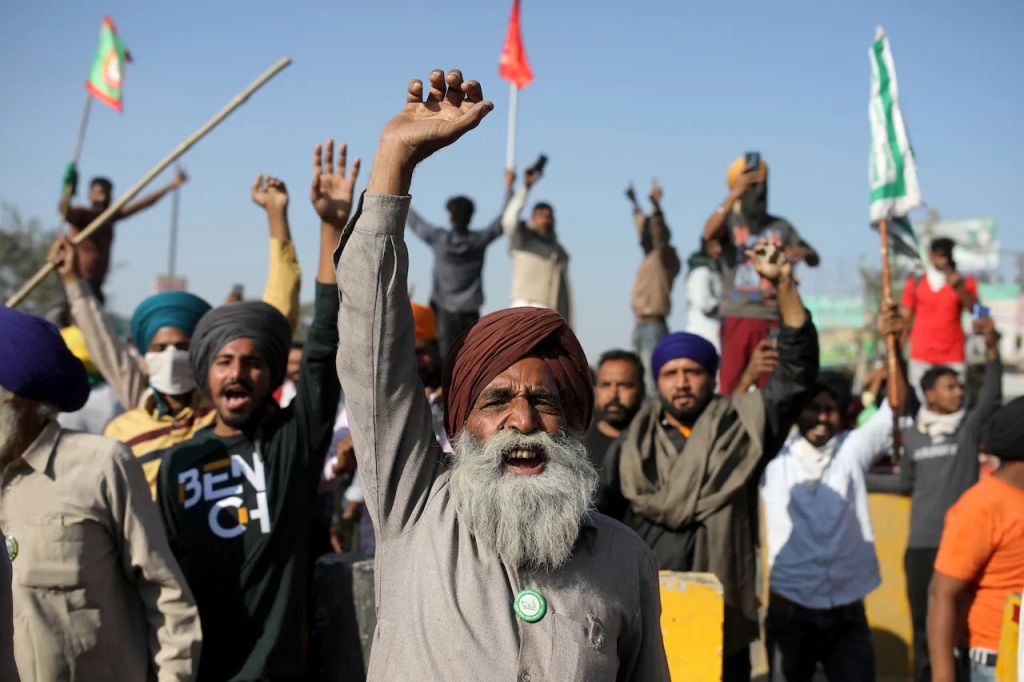Sixth round of talks with farmers ends; Union Agriculture Minister Narendra Singh Tomar says consensus on 2 out of 4 issues. After the talks, Tomar requested the farmer leaders to send home the elderly, women and children. [The Indian Express, 31 Dec 2020]
On 20 September 2020, Prime Minister of India, Narendra Modi referred to the New Farm bill as a Watershed moment in the history of Indian Agriculture that will empower tens of millions of farmers. The government maintains that these bills will make it effortless for farmers to sell their produce directly to big buyers. On 27 September 2020, President Ram Nath Kovind gave his assent to the three ‘Agriculture Bills’ that were passed by the Indian Parliament.
The three Farm Acts are:
- Farmers’ Produce Trade and Commerce (Promotion and Facilitation) Act 2020 – delimiting the stock of essential commodities
- Farmers (Empowerment and Protection) Agreement on Price Assurance and Farm Services Act 2020 – creates a framework for contract farming
- Essential Commodities (Amendment) Act 2020 – seeks to completely open up the sale of produce outside the Agricultural Produce Market Committees, or the APMCs [1].
The agriculture sector is a significant 18% of India’s $2.6 trillion GDP. Most of the produce is domestically consumed, less than 10% is exported and employs nearly 60% of India’s workforce. Thus the Indian agriculture sector has always been an important sector to manage for all governments as it significantly affects India’s large population which now stands at 1.3 billion, of which over 7000 people die out of hunger everyday [2]. The ruling state party of Punjab, Akali dal, who were also part of BJP’s National Democratic Alliance at the center realized that it was no longer tenable to stay in the alliance against the stance opposing the farmers bill. The protests against the farmers’ bill started way back in August 2020 and has continued till date in December 2020. The Farmers protest associated with the catch phrase “Delhi Chalo” (Go to Delhi) has seen 30 farmers union calling for complete withdrawal of the bill, over 300,000 farmers camped across 8 main highways entering Delhi, 18 political parties persuaded the president of India to reject the bill, many farmers self-immolating in protest, many dignitaries and sporting personalities returning national awards, 250 million people participating in national strike on 26th November 2020 in solidarity of the protest. The Farmers Bill deemed to benefit few capitalists (in future) has clearly failed to represent the aspirations of the nation on the grounds of parliamentarian majority and proves the systematic failure of World’s largest democracy.
With this reality of Indian farmers and Farm Law 2020, it is the duty of Muslims to know how they should view this issue from an Islamic perspective related to Agriculture. Allah (swt) has ordained laws for mankind in all aspects of life and has chosen Islam for humankind. Islam is an Ideology which has solutions for every human problem in this life. الْيَوْمَ أَكْمَلْتُ لَكُمْ دِينَكُمْ وَأَتْمَمْتُ عَلَيْكُمْ نِعْمَتِى وَرَضِيتُ لَكُمُ ٱلْإِسْلَـٰمَ دِينًا “This day I have perfected for you your religion and completed my favor upon you and have approved for you Islam as religion.” [Surah Al-Ma’idah 5:3]
Islamic Perspective:
- Islam forbids taxation upon agricultural inputs (GST, Custom duties etc…), which lowers the prices of seeds, pesticides and chemical fertilizers.
- Islam declares the energy sector as public property, so farmers receive electricity and fuel at affordable prices.
- Islam does not allow the renting of agriculture land. Rasululllah ﷺ forbade a rent or a share to be taken for the land” [Muslim].
- The owner of an agriculture land either has to cultivate his land himself, or the land is given to others to cultivate. «مَنْ كَانَتْ لَهُ أَرْضٌ فَلْيَزْرَعْهَا أَوْ لِيَمْنَحْهَا أَخَاهُ وَلاَ يُكْرِيهَا» “Whosoever has land, let him plant upon it or grant it to his brother.” [Bukhari].
- The owner of agricultural land cannot leave his land without farming for three consecutive years, otherwise that land will be given to another person who can cultivate the land. «عادي الأرض لله وللرسول، ثم لكم من بعد، فمن أحيا أرضا ميتة فهي له، وليس لمحتجر بعد ثلاث سنين» “Whoever revives dead land, it belongs to him, and one who fenced it off, has no right in it after three years (if not cultivated)”. [Abu Yusuf reported in Al-Kharaj].
- Hoarding and stocking the commodities to sell them with increased price is Haram in Islam. «لاَ يَحْتَكِرُ إِلاَّ خَاطِئٌ» “No one hoards but the sinne” [Muslim].
- Price fixing is also Haram in Islamic Shari’ah: «مَنْ دَخَلَ فِي شَيْءٍ مِنْ أَسْعَارِ الْمُسْلِمِينَ لِيُغْلِيَهُ عَلَيْهِمْ، فَإِنَّ حَقًّا عَلَى اللهِ أَنْ يُقْعِدَهُ بِعُظْمٍ مِنَ النَّارِ يَوْمَ الْقِيَامَةِ» “Whoever strives to increase the cost (of products) for Muslims, Allah, the exalted, will seat him in the centre of the Fire on the day of Resurrection.” [Ahmad].
The Ahkam of Islam linked ownership of agricultural land with its cultivation, bringing a revolution to the agriculture sector.
And finally, the Khilafah state (Caliphate) is the sole authority responsible for governing all the affairs of citizens of the state, be it Muslims or Dhimmis. Hizb ut Tahrir’s draft constitution for the upcoming Khilafah Rashidah states regarding the supervision of agriculture affairs, “The State supervises agriculture affairs and the purpose is to achieve the greatest possible use of the land”. [Article 159 of the Draft Constitution by Hizb ut Tahrir].
The Capitalist system which destroys the agriculture by its man-made laws must be abolished to secure the long-suffering farmers. It is up on Muslims to provide solution to the sufferings of farmers by striving to re-establish the Khilafah (Caliphate) on the Method of Prophethood which will solve current sufferings of farmers by implementing Islamic laws regarding agriculture and bring people out from the darkness of Capitalism to the light of Islam.
Hameed Bin Ahmad
References:
- www.bhookh.com/hunger_facts.php
- thewire.in/agriculture/farm-bills-indias-rural-issues

